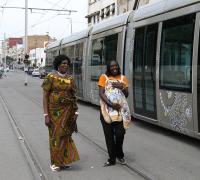Research project: From Transit to Settlement? – West African migrants in Morocco
Dorte Thorsen, University of Sussex
Since the mid-1990s, an sincreasing numbers of migrants from West Africa seek to transit to Europe via the Maghreb and often stop to earn money for the next leg of the journey or await money transfers from family or friends. They do not correspond to popular images of desperate young Africans aboard overcrowded boats. Many arrive legally to pursue higher education or work, but become irregular migrants when overstaying visas. Others were migrants in places such as Côte d’Ivoire and Libya, where social tension and escalating xenophobia eroded their livelihoods. The influx of sub-Saharan Africans to the Maghreb each year is estimated between 65,000 and 120,000, but only 20-38% of them transit to Europe. This discrepancy raises questions about the choices migrants make concerning remaining, continuing to other destinations or returning home. Questions must inevitably also address how their choices are constrained.
Migrants’ choices reflect their vision of what the outcome of migration should be; an image shaped and reshaped by their experiences, but not necessarily in a uniform way. Similar incidents are weighed differently depending on the context and the particular moment in the migrants’ lives. This study examines the trajectories of West African migrants in Morocco to unravel how local economies impact migrants’ hopes for improving their own and their family’s situations. It will assess the linkages between employment opportunities, educational background, individual perceptions of hope and achievement and willingness to accept temporary confinement. The objective of the study is thus to ascertain the key factors shaping decisions to attempt transiting to Europe or remain in the Maghreb.
Research questions:
Migrants’ choices reflect their vision of what the outcome of migration should be; an image shaped and reshaped by their experiences, but not necessarily in a uniform way. Similar incidents are weighed differently depending on the context and the particular moment in the migrants’ lives. This study examines the trajectories of West African migrants in Morocco to unravel how local economies impact migrants’ hopes for improving their own and their family’s situations. It will assess the linkages between employment opportunities, educational background, individual perceptions of hope and achievement and willingness to accept temporary confinement. The objective of the study is thus to ascertain the key factors shaping decisions to attempt transiting to Europe or remain in the Maghreb.
Research questions:
- How do West Africans navigate hope, disillusion and risk related to their irregular status in the Moroccan labour market to achieve their goals?
- How do earlier experiences in their home countries and at other migration destinations shape their ability to navigate the Moroccan context and put in perspective their perceptions of achievement or failure?
- How are West African migrants embedded in family networks? What expectations do young and old relatives have of them and how does this affect migratory choices?
Fieldwork took place in Rabat where a large population of regular and irregular migrants from sub-Saharan Africa live temporarily or long-term. Dorte Thorsen was associated with the research group E3R at the University Mohammed V in Rabat.
Emne
Region
Sub-Saharan Africa

